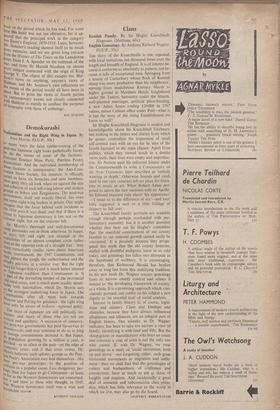Clans
Kentish Family. By Sir Hughe Knatchbull- Hugessen. (Methuen, 63s.)
English Genealogy. By Anthony Richard Wagner. (0.U.P., 55s.) THE story of the Knatchbulls is one repeated, with local variations, ten thousand times over the length and breadth of England. It is of interest be- cause it conforms so absolutely to pattern, not be- cause it tells of exceptional men. Springing from a tenant of Canterbury whose flock of Kentish sheep was more productive than his neighbours', moving from insalubrious Romney Marsh to higher ground at Mersharn Hatch, knighthood under the Tudors, baronetcy under the Stuarts, well-planned marriages, political place-hunting, a new • Adam house costing £20,000 in 1767- values, minor Cabinet office under Peel—what is it but the story of the rising Establishment we know so well?
Sir Hughe Knatchbull-Hugessen is modest and knowledgeable about his Knatchbull forebears; but nothing in the letters and diaries from which he quotes contradicts the impression of small, self-centred men with an eye (as he says of the fourth baronet) to the main chance. Apart from politics, which they viewed much as a dentist views teeth, their lives were empty and unproduc- tive. Sir Norton used his enforced leisure under the Commonwealth to write a Commentary on the New Testament, later described as 'entirely wanting in depth.' Otherwise hounds and cards (and in one case canaries) left no place for litera- ture or music or art. When Robert Adam pro- posed to adorn the new mansion with an Apollo, Sir Edward inquired only about 'his appearance'
mean as to the difference of sex'—and tact- fully suggested 'a sack or a little foldage of drapery to fall over.' The Knatchbull family portraits are readable enough (though perhaps overloaded with par- liamentary minuthe); but it is another question whether they bear out Sir Hughe's contention that 'the manifold' contributions of our county families to our national growth cannot easily be overstated.' It is precisely because they propa- gated this myth that the old county histories, stuffed with doubtful pedigrees, leave us so cold today, and genealogy has fallen into disrepute as the handmaid of snobbery. It is encouraging, therefore, that Richmond Herald has broken away at long last from this stultifying tradition. In his new book Dr. Wagner rescues genealogy from its narrow county context and relates it instead to `the developing framework of society' as a whole. It is a promising approach which, con- sistently pursued, can confer on his subject a new dignity as 'an essential tool' of social analysis. Interest in family history is, of course, legiti- mate and salutary. Clans and kinships and clienteles, because they have always influenced allegiances and alliances, are an integral part of English history. Our mistake, as Dr. Wagner indicates, has been to take too narrow a view'of family, identifying it with land and title. But the sheep-grazer or manufacturer who buys an estate and concocts a coat of arms is not the only one who counts. If, with Dr: Wagner, we treat genealogy as a study of 'social movement, both up and down'—not forgetting, either, such great
horizontal movements as migration and settlement—then we shall find that the genealogies of
cotters and husbandmen, of craftsmen and journeymen, have as much to tell as those of knights and esquires. And incidentally a great deal of nonsense and subconscious class preju- dice, which has little relevance to the world in which we live, may also go by the board.
GEOFFREY BARRACIOUGH




































 Previous page
Previous page